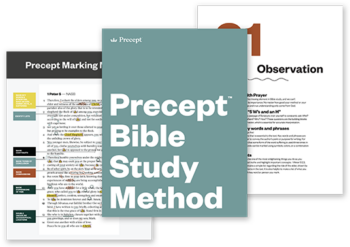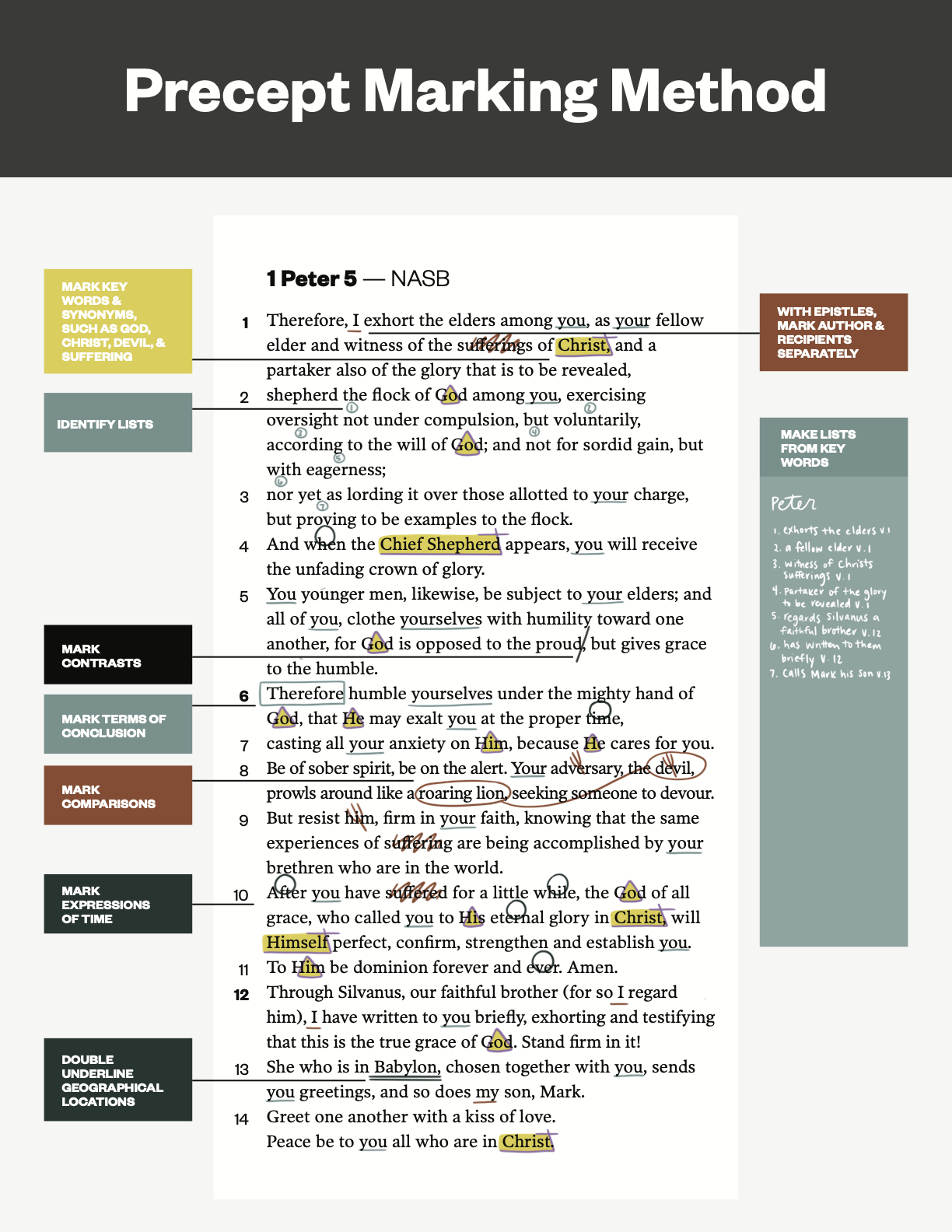We believe that relationship with God comes through knowing His Word, and that means studying it hands-on. Precept’s Method explains the nuts and bolts of our studies so that every student can discover God’s truth for themselves.
These steps—observation, interpretation, application—are numbered for clarity, but it’s important to remember that you don’t have to use them in order. As you study, you should expect to move fluidly between steps and respond to the text as it is presented.
01 Observation
01
Begin with Prayer
Prayer is often the missing element in Bible study, and we can’t overemphasize its importance. No matter how good your method or your tools, life-change and true understanding only come from God.
02
Ask the “5 W’s and an H”
As you study any passage of Scripture, train yourself to constantly ask: Who? What? When? Where? Why? How? These questions are the building blocks of precise observation, which is essential for accurate interpretation.
03
Mark key words and phrases
(see figure below)
A key word is one that is essential to the text. Key words and phrases are repeated in order to convey the author’s point or purpose for writing. For example, notice that some form of the word suffering is used three times in 1 Peter 5. Key words can be marked using symbols, colors, or a combination of the two.
Scroll or click to enlarge. Or download the full PDF.
04
Make lists
Making lists can be one of the most enlightening things you do as you study. Lists reveal truths and highlight important concepts. 1 Peter 5:2,3, for example, contains a simple list regarding the role of the elder, shown by numbering the items in the text. It is also helpful to make a list of what you learn about each key word or person you mark.
05
Watch for contrasts and comparisons
Contrasts and comparisons use highly descriptive language to make it easier to remember what you’ve learned. For example, Peter compares the devil to a roaring lion in verse 8. Peter also contrasts God’s attitude toward the proud and the humble.
06
Note expressions of time
The relationship of events in time often sheds light on the true meaning of the text. Marking them will help you see the sequence or timing of events and lead to accurate interpretation of Scripture.
07
Geographic Locations
Often it’s helpful to mark geographical locations, which tell you where an event takes place.
08
Mark terms of conclusion
Words such as “therefore,” “thus,” and “for this reason” indicate that a conclusion or summary is being made.
09
Identify chapter themes
The theme of a chapter will center on the main person, event, teaching, or subject of that section of Scripture. Themes are often revealed by reviewing the key words and lists you developed. Try to express the theme as briefly as possible, using words found in the text.
02 Interpretation
While observation leads to an accurate understanding of what the Word of God says, interpretation goes a step further and helps you understand what it means. As you seek to interpret the Bible accurately, the following guidelines will be helpful:
01
Remember that context rules.
If you lay the solid foundation of observation, you will be prepared to consider each verse in the light of the surrounding verses, the book in which it is found, and the entire Word of God. As you study, ask yourself: Is my interpretation of this passage of Scripture consistent with the theme, purpose, and structure of the book in which it is found? Is it consistent with other Scripture about the same subject? Am I considering the historic and cultural context? Never take a Scripture out of its context to make it say what you want it to say. Discover what the author is saying; don’t add to his meaning.
02
Always seek the full counsel of the Word of God.
When you know God’s Word thoroughly, you will not accept a teaching simply because someone has used one or two isolated verses to support it. You will be able to discern whether a teaching is biblical or not. Saturate yourself in the Word of God; it is your safeguard against wrong doctrine.
03
Remember that Scripture will never contradict Scripture.
Remember, all Scripture is inspired by God. Therefore, Scripture will never contradict itself. Sometimes, however, you may find it difficult to reconcile two seemingly contradictory truths taught in Scripture, such as the sovereignty of God and the responsibility of man. Don’t take a teaching to an extreme that God doesn’t. Simply humble your heart in faith and believe what God says, even if you can’t fully understand or reconcile it at the moment.
04
Don’t base your convictions on an obscure passage of Scripture.
An obscure passage is one in which the meaning is unclear or not easily understood. Because these passages are difficult to understand even when proper principles of interpretation are used, they should not be used as a basis for establishing doctrine.
05
Interpret Scripture literally.
God spoke to us that we might know truth. Therefore, take the Word of God at face value—in its natural, normal sense. Look first for the clear teaching of Scripture, not a hidden meaning. Understand and recognize figures of speech and interpret them accordingly. Consider what is being said in the light of its literary style. For example, you will find more similes and metaphors in poetical and prophetic literature than in historical or biographical books. Interpret portions of Scripture according to their literary style. Some literary styles in the Bible are: Historical—Acts, Exodus; Prophetic—Revelation, Isaiah; Biographical—Luke; Didactic (teaching)—Romans; Poetic—Psalms; Epistle (letter)—2 Timothy; Proverbial—Proverbs
06
Look for the single meaning of the passage.
Always try to understand what the author had in mind when you interpret a portion of the Bible. Don’t twist verses to support a meaning that is not clearly taught. Unless the author of a particular book indicates that there is another meaning to what he says, let the passage speak for itself.
03 Application
The first step in application is to find out what the Word of God says on any particular subject through accurate observation and correct interpretation of the text. Once you understand what the Word of God teaches, you are then obligated before God to accept that truth and to live by it.
Scripture will always teach what is right, show us where we are wrong, how to correct, and train us in right living; so that we are complete, fully equipped for every good work. 2 Timothy 3:16-17.

